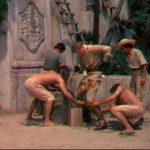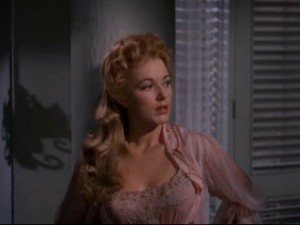 The Commissioner says “Marabunta!”—meaning army or legionary ants—and the composer of the score, Daniele Amfitheatrof, announces a jagged, descending outburst from the orchestra, an exaggerated variation on the standard stinger chord. Now somewhat anticlimactic, the ant motif had been first heard in the main title; it would have been more effective if held until the first actual reference to the ants.
The Commissioner says “Marabunta!”—meaning army or legionary ants—and the composer of the score, Daniele Amfitheatrof, announces a jagged, descending outburst from the orchestra, an exaggerated variation on the standard stinger chord. Now somewhat anticlimactic, the ant motif had been first heard in the main title; it would have been more effective if held until the first actual reference to the ants.
On a later visit—in the meantime Joanna and Christopher have maintained their standoff—the Commissioner announces that the ants are indeed on the move and delivers one of the most melodramatic lines in the film: “Leiningen, you’re up against a monster twenty miles long and two miles wide, forty square miles of agonizing death! You can’t stop it!”
Christopher decides to take Joanna out of harm’s way. They agree that their so-called marriage hasn’t worked—more his initiative than hers—and they head through the jungle, toward a river port where she can catch a boat for New Orleans. On the journey, their relationship softening a bit, they find a deserted village and, in a drifting canoe, an ant victim (John Dierkes), a planter who had, in an earlier scene, abused his workers. For the lack of any other, except for the ants, he’s the stand-in villain of the show.
 From a knoll, the jungle party see a black, dead patch on a distant mountain. Marabunta! The ants, Leiningen says, are headed for his plantation. The creatures have cut off the way to the river port, so Joanna must return with him to the hacienda. They fortify the building with a moat and then, when the ants bridge that, use brush and furniture as a fire barrier. In desperation, Leiningen decides to open a distant dam, covering himself in oil (actually syrup) for protection and staggering through the ants, even groveling among them for added drama. The ensuing flood drowns the ants, but the house, though stripped of its furnishings, is saved.
From a knoll, the jungle party see a black, dead patch on a distant mountain. Marabunta! The ants, Leiningen says, are headed for his plantation. The creatures have cut off the way to the river port, so Joanna must return with him to the hacienda. They fortify the building with a moat and then, when the ants bridge that, use brush and furniture as a fire barrier. In desperation, Leiningen decides to open a distant dam, covering himself in oil (actually syrup) for protection and staggering through the ants, even groveling among them for added drama. The ensuing flood drowns the ants, but the house, though stripped of its furnishings, is saved.
Joanna’s fortitude, which had been evident since she first arrived at Leiningen’s dock, and her persistence in working on their relationship rule the day, as the cliché goes. The water having receded, she rushes out to meet Christopher and they embrace, their love now triumphant.
Heston’s stiff movements and staccato delivery go far in reinforcing the contradictory makeup of Christopher Leiningen. His best scene with Parker, his character’s first vulnerable moment, occurs just before they head into the jungle, when he comes into her bedroom. She is reading one of the books which he says he bought by weight. “Eight hundred pounds of books.” When she says that, no, they are his books and reflect good taste, he even quotes one of the authors. Before he leaves the room—no kiss is exchanged, which is more effective than had there been one—he comes as near as he can to an apology for his behavior. “I don’t like to hurt things,” he says. “I don’t know what went wrong. I never disliked you.” Well, folks, he certainly gave a good impression of it for the first half of the movie!
 Eleanor Parker, who would receive the last of her three Oscar nominations for Interrupted Melody the following year, gives a strong performance, if not a particularly memorable one. Her soft, yet resilient character is a complement to the hardness of Heston’s, with a clear hint that she is as lonely in her way as she has declared him to be. Despite the tension, there is a subtle charisma between the two stars, even if she can muster a bit more allure than he.
Eleanor Parker, who would receive the last of her three Oscar nominations for Interrupted Melody the following year, gives a strong performance, if not a particularly memorable one. Her soft, yet resilient character is a complement to the hardness of Heston’s, with a clear hint that she is as lonely in her way as she has declared him to be. Despite the tension, there is a subtle charisma between the two stars, even if she can muster a bit more allure than he.
William Conrad, who had narrated a few of the Lone Ranger radio programs and would become the title detective in the early 1970s TV series Cannon, affects for The Naked Jungle an accent of unknown origin—French perhaps? His acting is forthright, nothing more. Here his weight, always a problem, suggests “stockiness,” but by the time of Cannon it would qualify by current standards as obese.